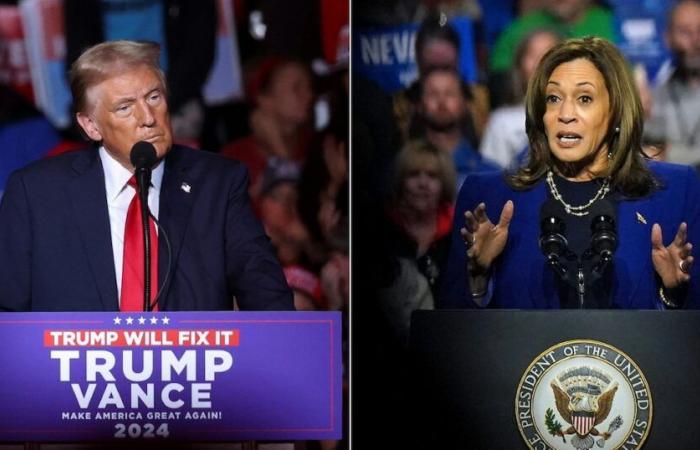Donald Trump and Kamala Harris are not letting up their campaign efforts, with less than 24 hours before the US presidential election on November 5. The objective: to make a difference in a handful of particularly contested states where, as in 2020, the presidential election could be decided by a few tens of thousands of votes. For the moment, no candidate stands out significantly among the polls at the national level, with the results varying from one agency to another. According to the site FiveThirtyEight, which compiles several studies, Kamala Harris would have 47.9% of voting intentions, compared to 47% for Donald Trump.
All eyes are therefore on the “swing states”, which do not traditionally lean towards one party or the other. Analysts are scrambling to try to see this as a sign of a victory for one candidate rather than another, thus weighing on the vote at the federal level.
READ ALSO: Donald Trump – Kamala Harris: the war of the sexes rages, by Eric Chol
Neck to neck in the pivotal states
The winners of the 2016 and 2020 elections triumphed there: the most coveted state is that of Pennsylvania, with its 19 electors. The two candidates are neck and neck: 47.9% for Donald Trump, against 47.7% for Kamala Harris. In this traditionally industrial state, although in decline, the latter hopes that the support shown by the unions will be favorable to her in the end, just like in Michigan, where the current vice-president is leading by a small point ( 47.9% versus 47.1%). Democrats also hope to attract moderate Republicans in Wisconsin, repelled by Donald Trump's outrageous rhetoric. The latter is positioned behind Harris, at 47.4% in the polls against 48.2% for his opponent, according to FiveThirtyEight.
Significant gray areas nevertheless persist on the electoral map. In Georgia, if Trump is ahead by 1.5 points, things can still change. No clear trend is emerging: in the wake of major anti-racist movements, this conservative state with a large African-American population preferred the Democrats in 2020. Kamala Harris hopes to rely on the vote of African-Americans, just like in North Carolina. But the religious electorate, quite substantial in Georgia, praises Donald Trump for his opposition to abortion.
READ ALSO: Patrick Weil: “Donald Trump unpredictable? Woodrow Wilson was just as unpredictable”
Arizona (where Trump leads by 2.6 points) and Nevada (where only half a percentage point separates the candidates) are two other pivotal states in which it is difficult to say who will win, with certain key political themes (such as immigration) or the evolution of electoral sociology in recent years making predictions uncertain.
Democrats conquer Republican territory in Iowa
More surprising this time, a survey published this weekend in the local daily Des Moines Register gave the Democratic candidate in the lead in Iowa, a state not belonging to the swing states, and traditionally acquired by the Republicans, so much so that “neither of the two candidates was concerned about it in the home stretch”, as explained by the Washington Post. Five months earlier, the same poll gave Donald Trump in the lead by 18 points against current President Joe Biden, before he abandoned the race for the White House.
READ ALSO: Trump-Harris seen by Philip Bump, of the “Washington Post”: “For the second time, this could cost him his election…”
This 3-point lead in favor of Kamala Harris (47% against 44% of voting intentions for Donald Trump), could be explained by the growing popularity of the Democrat among women, particularly those who are older and not aligned with one party or another. “Independent women chose Harris over Trump 57% to 29%, an increase from September, when they gave her a lead of just five points,” the study said. In the last two presidential elections, Donald Trump won Iowa by a large majority. Please note, however, that the survey has a margin of error of 3 to 4 points.
As in 2020, Donald Trump seems in any case to be preparing the ground for a challenge to the results, while the vote promises to be very close: “They are trying with all force to steal” the election, he said in trip this weekend. In France, the first predictions should be known during the night from Tuesday to Wednesday due to the time difference. But where the vote is close, the purge could take days or even weeks.






